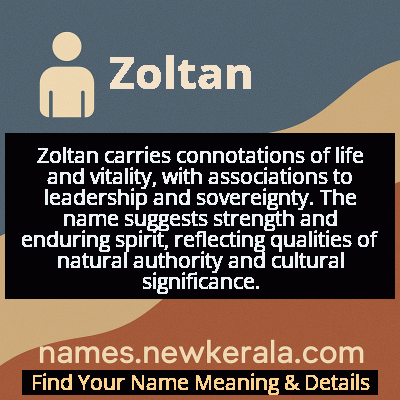Zoltan Name Meaning & Details
Origin, Popularity, Numerology Analysis & Name Meaning of Zoltan
Discover the origin, meaning, and cultural significance of the name ZOLTAN. Delve into its historical roots and explore the lasting impact it has had on communities and traditions.
Name
Zoltan
Gender
Male
Origin
Greek
Lucky Number
7
Meaning of the Name - Zoltan
Zoltan carries connotations of life and vitality, with associations to leadership and sovereignty. The name suggests strength and enduring spirit, reflecting qualities of natural authority and cultural significance.
Zoltan - Complete Numerology Analysis
Your Numerology Number
Based on Pythagorean Numerology System
Ruling Planet
Neptune (Ketu)
Positive Nature
Intuitive, analytical, spiritual, and inquisitive.
Negative Traits
Secretive, reserved, aloof, and can be overly critical.
Lucky Colours
Green, yellow.
Lucky Days
Monday.
Lucky Stones
Cat’s eye, moonstone.
Harmony Numbers
1, 5, 6.
Best Suited Professions
Scientists, researchers, spiritual leaders, detectives.
What People Like About You
Depth of knowledge, analytical skills, spirituality.
Famous People Named Zoltan
Zoltán Kodály
Composer and Ethnomusicologist
Developed the Kodály Method of music education and composed significant Hungarian classical works
Zoltán Gera
Footballer
Hungarian international midfielder who played for West Bromwich Albion and Fulham in the Premier League
Zoltán Halmay
Swimmer
Hungarian Olympic champion who won multiple gold medals in the 1904 and 1908 Olympics
Zoltán Kocsis
Pianist and Conductor
Renowned Hungarian pianist known for his interpretations of Bartók and Debussy
Name Variations & International Equivalents
Click on blue names to explore their detailed meanings. Gray names with will be available soon.
Cultural & Historical Significance
The name's cultural significance extends beyond Hungary through diaspora communities and cultural exchange. In Greek contexts, while not originally Greek, the name has been adopted and adapted through historical interactions between Hungarian and Greek cultures, particularly during periods of Ottoman influence in the Balkans. The name represents a bridge between Eastern and Western European cultural traditions, embodying the complex historical relationships between Turkic, Hungarian, and neighboring cultures including Greek communities in the region.
Extended Personality Analysis
Individuals named Zoltan are often perceived as strong, charismatic leaders with a natural authority and commanding presence. They tend to be ambitious, determined, and possess a strong sense of purpose, often excelling in leadership roles where they can direct and inspire others. Zoltans are typically seen as confident, self-assured individuals who approach challenges with strategic thinking and resilience. Their personality often combines traditional values with innovative thinking, making them effective at balancing respect for established systems with the ability to implement meaningful change.
Many Zoltans display a protective nature toward those in their care and demonstrate loyalty to their cultural heritage and family traditions. They are often described as having a regal bearing and natural dignity that commands respect without being overtly authoritarian. The name suggests someone who is both grounded in tradition and forward-thinking, capable of honoring the past while building for the future. Zoltans are frequently seen as pillars of their communities, whether in professional settings, family life, or cultural organizations, where their strength of character and commitment to excellence serve as inspirations to others.
Modern Usage & Popularity
In contemporary times, Zoltan maintains moderate popularity primarily in Hungary and among Hungarian diaspora communities worldwide. While it's not among the top-ranking names in most Western countries, it has seen occasional use in English-speaking countries, often chosen by parents seeking a distinctive, culturally rich name with strong historical roots. The name has experienced some resurgence in recent years as part of the trend toward unique, internationally-flavored names that stand out while carrying meaningful heritage. In Hungary, it remains a classic choice that conveys tradition and national pride, though it's less common among younger generations than more modern Hungarian names. The name's usage patterns show it to be particularly popular among families with strong connections to Hungarian culture or those appreciating its powerful, regal connotations.
Symbolic & Spiritual Meanings
Symbolically, Zoltan represents leadership, strength, and cultural heritage. The name carries connotations of sovereignty and command, reflecting its royal origins and association with historical rulers. It symbolizes the preservation of tradition and cultural identity, particularly within Hungarian contexts, while also representing the ability to adapt and thrive in changing circumstances. Metaphorically, Zoltan suggests a bridge between ancient traditions and modern leadership, embodying the qualities of a natural-born leader who respects heritage while navigating contemporary challenges. The name also symbolizes vitality and enduring spirit, connecting to its possible meanings related to life and rulership, suggesting someone who brings energy and direction to any endeavor they undertake.

